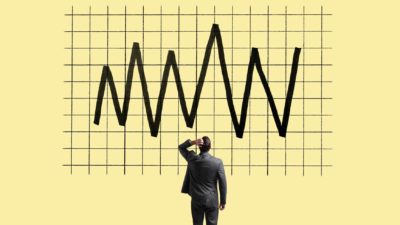"You look familiar… cricket?"
So began a conversation when I sat down at my local cafe this morning.
"No… finance", I replied.
"I know your face from somewhere" he said.
I told him what I do, and that he'd probably seen me on telly, and the penny dropped.
And then the conversation moved on.
"My son made me buy some Bitcoin yesterday. 'Dad, there's going to be a run on the banks' he said."
"It was only a little bit. But I've already made twenty bucks."
Now, I've written before about Bitcoin.
It is not a topic you broach, at least not negatively, if you are scared of hearing some unvarnished opinions and freely-proffered character analysis.
Thankfully, I'm not.
I did buy $100 worth of Bitcoin some years back, just to go through the process. And I still own it. (For my lack of due diligence, I'd managed to choose an app which allowed Australian customers to buy, but not sell! Apparently that's changed… but I haven't bothered checking.)
But – and this is the part I type from under the desk – I don't think Bitcoin is an investment-grade asset.
Why?
Because to own it relies on a guess (gamble?) that someone might pay you more for it in future. It has no operations. It produces no income. It just… sits there.
"Ah, but that's no different to gold" some will shout.
And they're not wrong.
But here's my two part rebuttal:
First, I don't think gold is an investment grade asset either. (Sorry, Bitcoiners, you'll have to compete with the gold bugs to get in the queue to insult me now!) It also does nothing, and produces nothing.
But second, gold has, at least, an incredibly long history of valuation and acceptance as an asset, and it's possible to at least backstop its value based on the cost of mining.
Yes, yes… send me your hate mail if you must.
(Fair warning – our Member Services team are very good people who don't need to read insulting or offensive language, and have been given carte blanche to simply delete correspondence that contains same. I'm very happy to hear from people with a different view, but abusive language will be dispatched to the fine leg boundary with a flick of the metaphorical wrist.)
Will someone pay more for Bitcoin at some point in the future? Maybe.
And you're welcome to speculate on that outcome, if you choose.
Just don't call it investing.
But also – and this is my main point – don't let it distract you.
See, there is a very, very long list of things that could happen.
(Almost) anything is possible.
But likely?
See, investing isn't a pursuit that requires you to simply guess what someone will pay for an inanimate object (real or digital) in future, with no fundamental basis.
What will people pay for gold in 10 years?
What will they pay for Bitcoin in 15 years?
Who knows. There's nothing on which to base your guess, short of some blind prediction of human behaviour.
It is – and this'll really get 'em going – the equivalent of reality TV.
There is no reason Bitcoin won't trade for $0.01 in 2035. Or $1 million. It'll come down to one simple thing: how 'popular' the asset is.
No, not what it's worth. That's different.
Now, compare that to a profitable operating business. Or, more simply, as Warren Buffett likes to say, agricultural land.
How much would you pay for an acre of prime farmland?
You'd start by thinking about what that land could do.
What stock or crops would it support? Which would provide the greatest profit, based on the price you could get, and the cost of production?
You'd allow for some great years, some terrible years, and some good years. You'd add it all up and then decide how much you'd pay the current owner to buy that land.
Of course, we can't know what the weather will do. Or how prices might fluctuate. So you'd allow for all of that, when deciding on a price.
That's what investing is. It's looking at what we call the 'fundamentals' of an asset – what it generates, and how that might change. And then paying a price that takes all of that into account and still offers the good potential of profit.
That doesn't mean people don't make investing mistakes. And it doesn't mean people don't hijack the word and apply it to other things, hoping to convince themselves they're 'investing' when they're really gambling or speculating.
But it means that, done properly, they're considering the range of future cash flows from an asset, then deciding what price they'd pay to gain a share of those cash flows.
If you're not doing that… you're just punting.
You're punting on being able to guess how others might feel in future.
Will they still like Bitcoin? Or Gold?
Will they be excited? Or pessimistic?
Who knows.
And yet, they'll 'invest' thousands (as a group, many, many millions) of dollars on the basis that somehow they think they can?
I'm not intending to be critical of those people themselves, by the way. Everyone is entitled to use their money as they see fit.
But even if they guess right, it's just not investing.
Now, lest you think I'm just here for a cathartic tongue lashing, I'll tell you why I'm writing all of this.
And – believe it or not – the motivation doesn't have anything to do with Bitcoin or gold.
My motivation is to stop you fixating on the short term… particularly short-term risks.
Like that bloke I met this morning, whose son has convinced him to change his investment strategy because he has a hunch of what might happen next.
His crystal ball must be better than mine.
And while the risks he fears may actually come to pass… they mightn't, either.
See, if your investment philosophy involved evading all risk, then the bad news is that, well, it's not possible.
Reckon 'cash' is risk free? There's no certainty that the government guarantees will be able to be met in every single circumstance. (But it's about as low-risk as you can get in this life.)
Cash under the mattress, or in a hole in the backyard? Good luck with that.
But even if you accept those risks, what about inflation that's eating away your purchasing power as you read this?
And other risks?
Well, people have been telling me China was going to have a 'hard landing' for the last dozen years.
Property was going to crash in 2009.
There's been a recession 'looming' every year since the GFC.
Fiat currency was going to die.
You get the idea.
You know why shares have gone up, over time?
Because businesses do things that people want, and do them profitably. And they do more of them, leading to more profits.
Sure, sometimes the market gets overly exuberant. Sometimes overly pessimistic.
But the businesses? They keep on doing their thing. Some die. Some are born. But, as a group they keep on keeping on.
No, that's not a guarantee. I'm not allowed to give you one. And morally, I wouldn't, anyway… because there are no guarantees about the future.
But I'll tell you what I do.
I invest, regularly, by trying to pay decent prices for a diversified portfolio of understandable businesses. And then I wait.
Some years will be better than others, for those businesses.
Some years will be better than others, for their share prices.
But, if I've chosen well, those companies will be bigger and better, as a group, in 5, 10 and 20 years' time. And if I've paid a decent price, I expect I'll be well rewarded.
If you don't want to pick companies, you can just buy a broadly diversified, low-cost index fund.
Or… you can take a punt on whether people will still think Bitcoin, or gold, will be cool in 2033.
I mean, it's not like some fads end, right?
Maybe it's not a fad. But maybe it is.
The choice is yours. But please, choose wisely.
Fool on!









